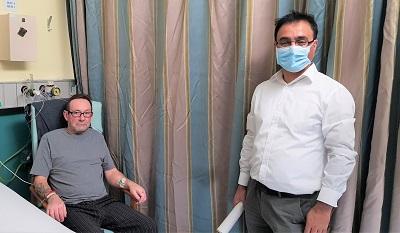
Tayside cancer patients are now benefitting from robotic surgery.
NHS Tayside took delivery of a surgical robot last year to support minimally invasive surgery for cancer patients. Surgeons and their multi-disciplinary teams then completed intensive training before the service saw its first patients at the end of 2021.
The robot is treating patients for colorectal, upper gastrointestinal, urology and gynaecological cancers, carrying out complex surgical procedures especially those where the site of the cancer can make it more difficult to safely operate.
The robot enables a surgeon to operate on these cancers more easily as it accesses hard-to-reach areas of the body by mimicking the surgeon’s hand movements. It makes much smaller incisions allowing intricate procedures such as tumour and organ removal to be carried out with more precision.
Patients then benefit from reduced hospital stay and quicker recovery, reduced pain, reduced complications, reduced blood loss and ultimately, improved outcomes.
One of the first patients in Tayside was 69-year-old urology patient Mr Stanislaw Szeszko who had treatment for prostate cancer.
His surgeon Professor Ghulam Nabi said, “The introduction of robotic assisted surgery for patients with prostate cancer is transformational in their treatment and recovery pathway.
“The benefits from using precision instruments and keyhole surgical techniques for patients are evidenced in reduced blood loss and time spent recovering in hospital. Patients who have had robotic surgery for complex cancer surgery are usually able to go home the day after surgery instead of spending almost a week in hospital.”
Mr Szeszko is now recovering at home but was keen to share his experience of having robotic surgery.
Mr Szeszko, said, “I feel very grateful that I was able to benefit from this new type of surgery at Ninewells Hospital. I was not at all concerned about having the robotic assisted surgery as the entire procedure was fully explained to me.
“I was diagnosed with prostate cancer and the traditional way to deal with it would have seen me having this major operation and having to stay in hospital for around seven days. I had the robotic assisted surgical procedure and, amazingly, although it was a major operation, within 24 hours I was sitting up waiting to be discharged from the ward, which I was very happy about.”
Professor Nabi added, “NHS Tayside’s robotic assisted surgical service and the investment in cutting-edge technology supports patients to have the best experience and improved outcomes. Whilst it is early days for the robotic assisted surgical service in Tayside, it is hoped that this advanced surgical technology will develop further and bring even more benefits in the future.”
Photograph: Patient Stanislaw Szeszko with Professor Ghulam Nabi